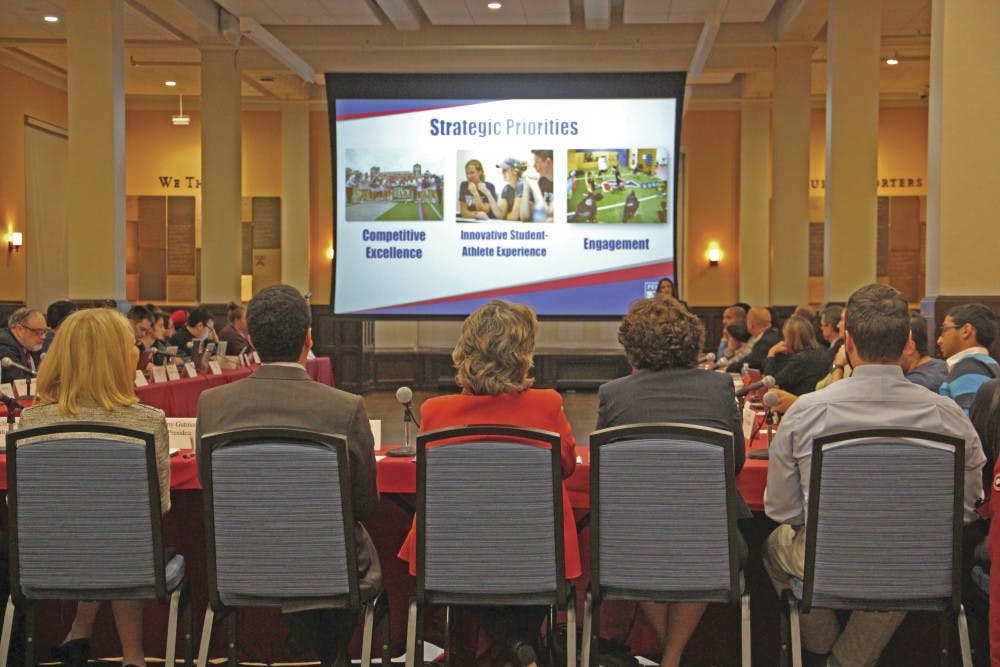Houston Hall's Bodek Lounge was packed on Wednesday afternoon as dozens of students filed in to attend the University Council's its biannual open forum, which is meant to serve as a platform for any and all members of the Penn community to raise issues for discussion.
But while four pre-selected people were allowed a few minutes to speak, the council engaged in little open discussion.
The UC functions as a representative body made up of undergraduate and graduate students, faculty, staff, and executive administrators, including Penn President Amy Gutmann and Provost Wendell Pritchett. All members are meant to have the ability to recommend policy changes to the University.
At the forum, three undergraduate students and one professor expressed their concerns with various aspects of University life but none received a substantive response from administrators. One of the pre-selected presenters, Diane Deissroth, Wharton Real Estate Department business administrator, did not attend.
One of the speakers, Simone Unwalla, the captain of the women's fencing team and a College junior, accused the administration of artificially inflating the rosters of women's athletic teams to abide by Title IX anti-discrimination policy, which states that the number of female athletes at an institution needs to be proportionate to the number of female students at the institution.
Unwalla noted that five women listed on the fencing team's roster do not regularly attend practice and added that she has not even met three of them.
Penn athletics, like many other peer institutions, has been plagued for years by complaints of an athletic gender gap.
While both Grace Calhoun, the director of athletics and recreation, and Brian Sennett, the chief of Penn Sports Medicine were present at the beginning of the meeting to discuss concussion testing and the mental health of student athletes, both left before Unwalla spoke.
The moderator, University Secretary Leslie Kruhly, thanked Unwalla for commenting and moved onto the next speaker. None of the other administrators present responded to Unwalla's complaint.
“It’s really up to any member of the council to ask follow up questions to further the discussion, but we really didn’t see any of that,” College junior Jay Shah, a member of UC Steering Committee and the vice president of the Undergraduate Assembly, said.
Third-year School of Design and School of Arts and Sciences graduate student Miles Owen, who is the Graduate and Professional Student Assembly president, said he was disappointed that the forum was so short and that it included only four speakers.
Community members who wished to be guaranteed speaking time had to submit a request the Office of the University Secretary by the morning of Nov. 28, and at the forum itself, the speaking time of all of approved speakers was roughly three minutes.
College senior and Undergraduate Assembly President Michelle Xu said she could understand why attendees might have been surprised by administrators' lack of engagement, but added that this was part of University Council "protocol."
"There is a protocol [to these meetings]," she said. "You make a statement, they take everything that was said at UC and deliberate it at UC steering. It's not that administrators don't want to respond."
However, Xu also said she is not aware of any formal mechanism for students not on University Council to ensure that the concerns they raised at the open forum will actually be followed up on by administrators or other members of the council.
"I don't think there is any way … I don't know any specific mechanism," she said.
While there was little engagement between council members and speakers during the open forum, a debate around Penn's continued investment in fossil fuels erupted during a later part of the meeting, which was reserved for council members to speak.
During the open forum, College sophomore Claudia Silver, a representative of Fossil Free Penn, condemned the University's continued investment in fossil fuels and the administration's lack of engagement with the wider student body.
As she spoke, other members of FFP lined Bodek Lounge holding flyers calling upon the administration to make a change. Members of the group also attended the last open forum meeting in February donning surgical masks in protest of Penn's continued investment in fossil fuels.
Later, the council representative of the College Republicans and Wharton junior Nile Nwogu criticized the FFP divestment platform, arguing that the Trustees had a duty to "maximize returns."
"We believe that with rising tuition costs, it is important that the investment managers of the endowment are permitted to fulfill their fiduciary duty to maximize returns and we trust that they will make investment decisions to do so," he said.
College senior Bevan Pearson, co-chair of the Student Sustainability Association at Penn, responded by affirming the group's support for FFP's platform, adding that divestment is financially feasible.
Since the beginning of the semester, the UC meetings have suffered from low attendance among the faculty and graduate student bodies. This has prevented the council from voting on any policy resolutions since in order to do so, at least 40 percent of the general body is required to be in attendance.
Owen said only seven graduate representatives attended this meeting, which was an increase from the last meeting, but still less than half their allotted representatives.
Shah added that he and other undergraduate members of the UC are still working to increase attendance.
“What we are really trying to do is ask ‘How can we make this a more effective forum?’,” Shah said. “Historically the council has served as a forum where a lot of policies were discussed. For the recent past, the council has served as an advisory board for the senior administration.”
A previous version of this article wrote that Nile Nwogu had said that the Trustees' job is to secure Penn’s “fiscal future." This was inaccurate. The Daily Pennsylvanian regrets the error.



